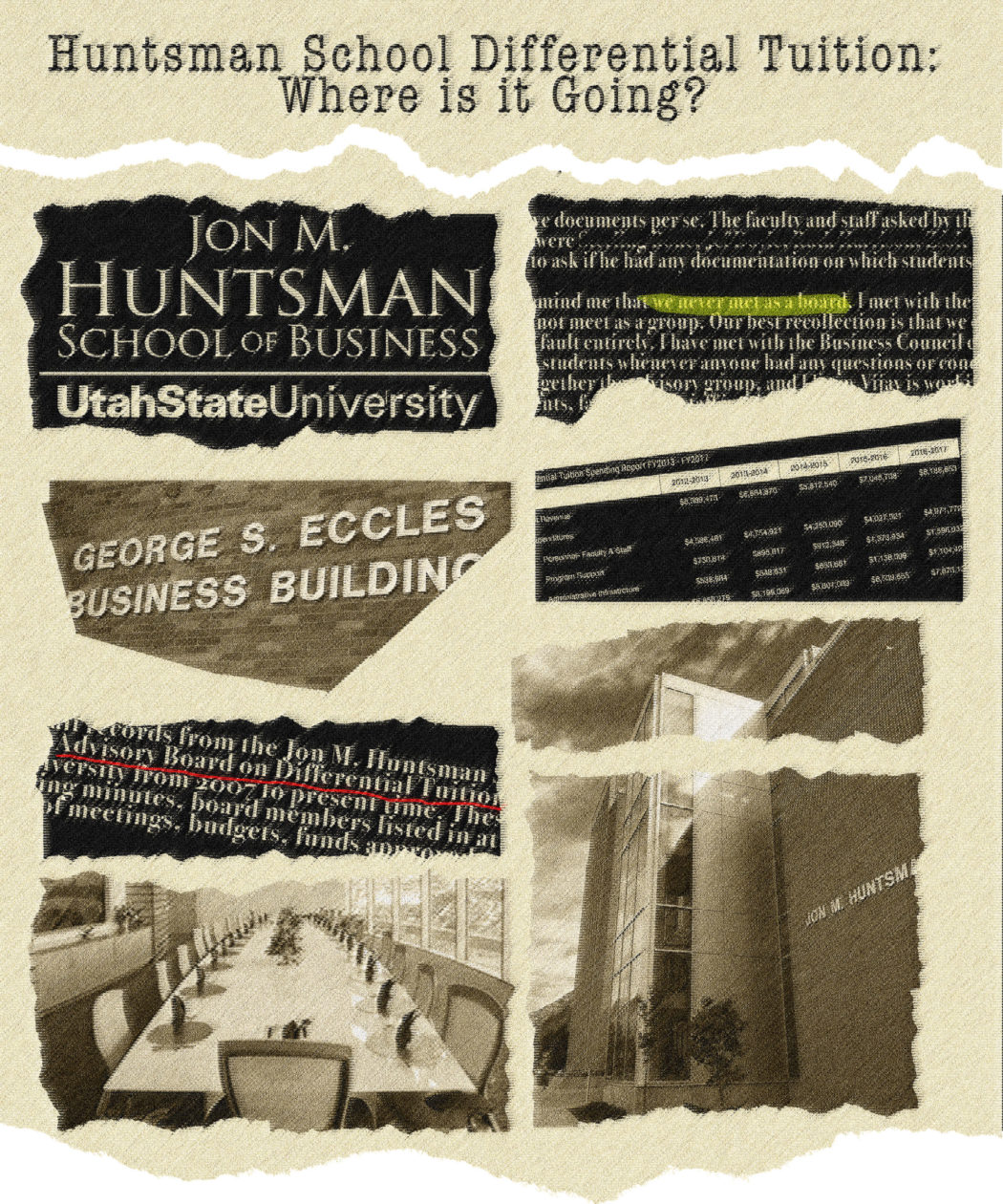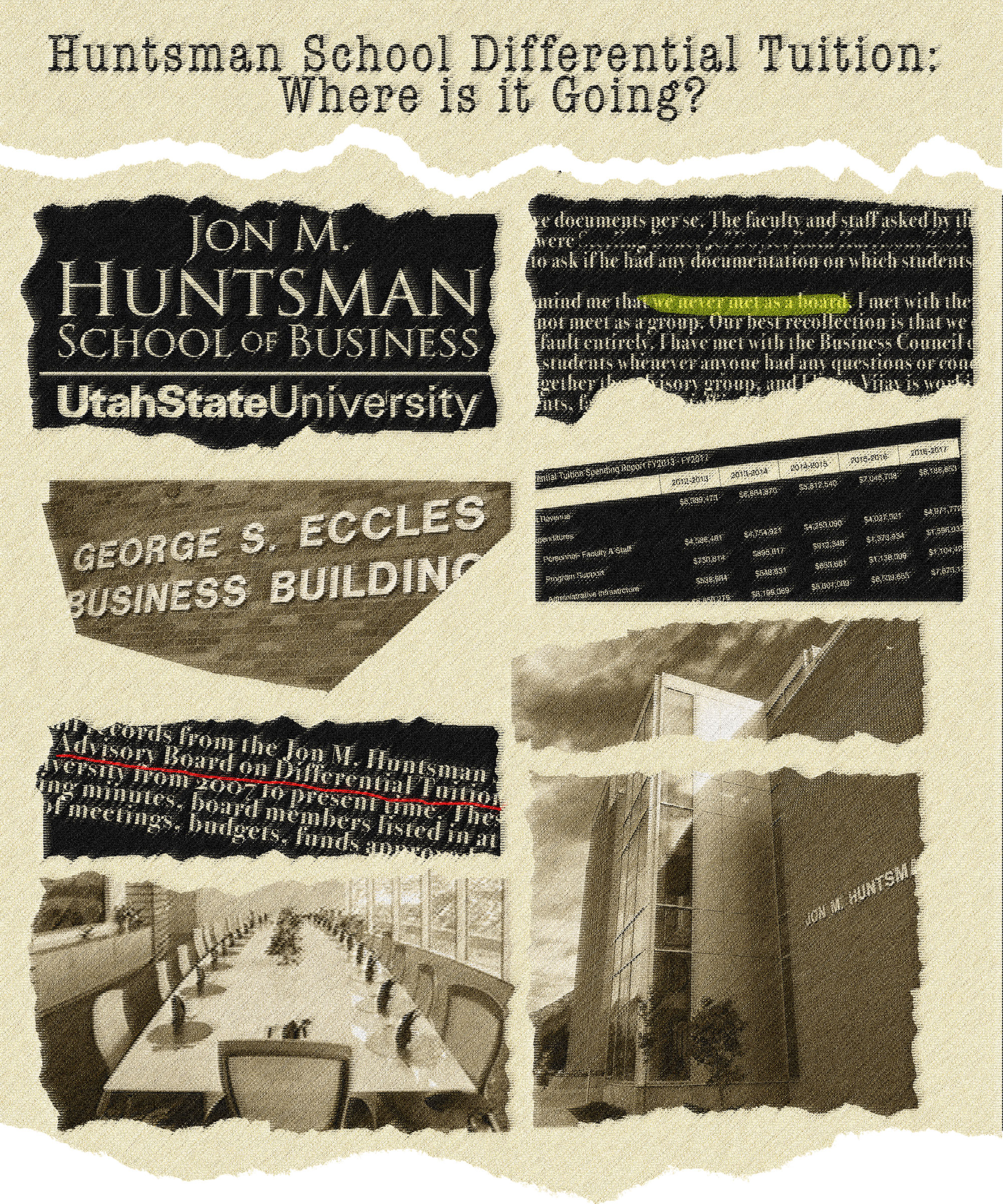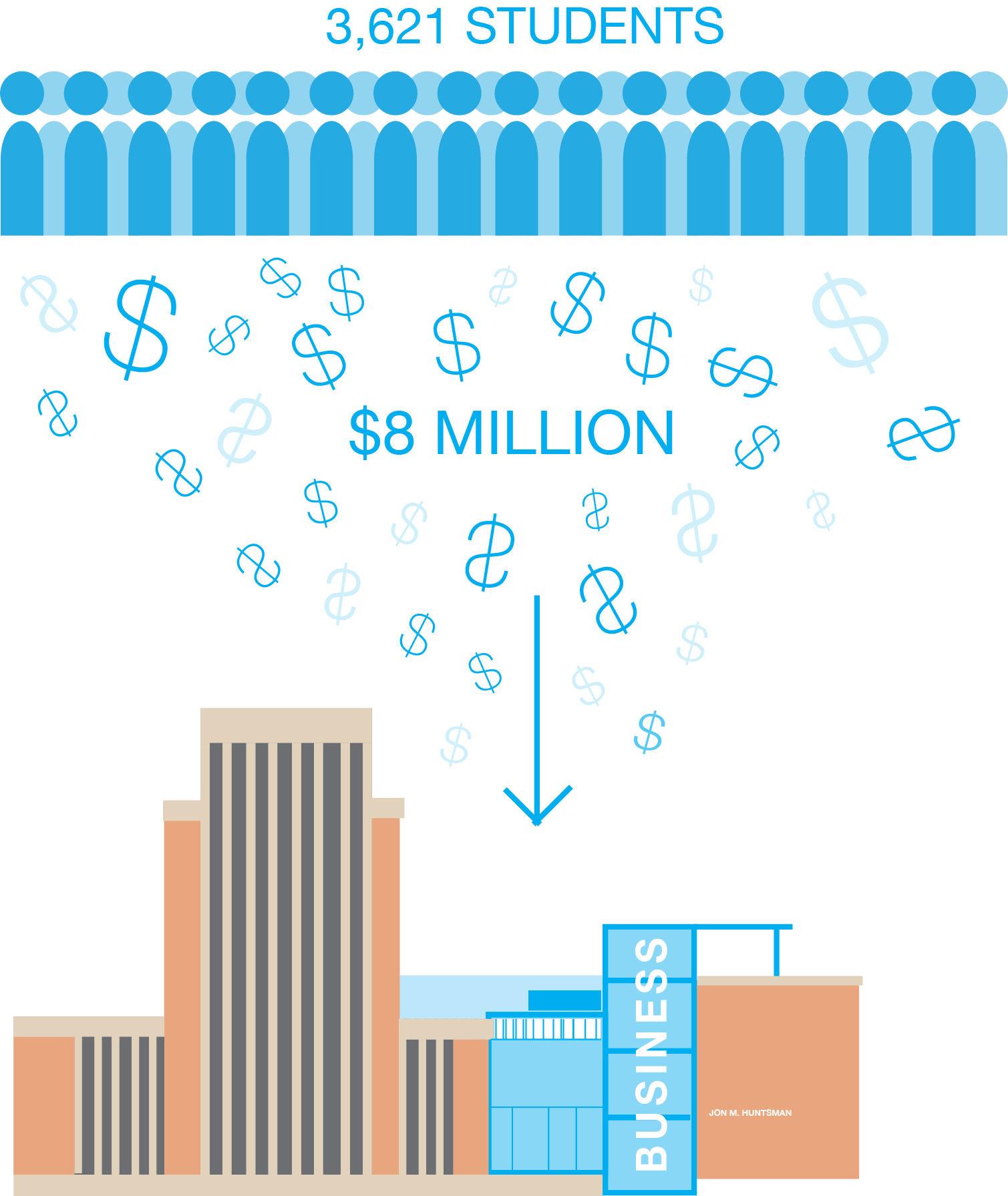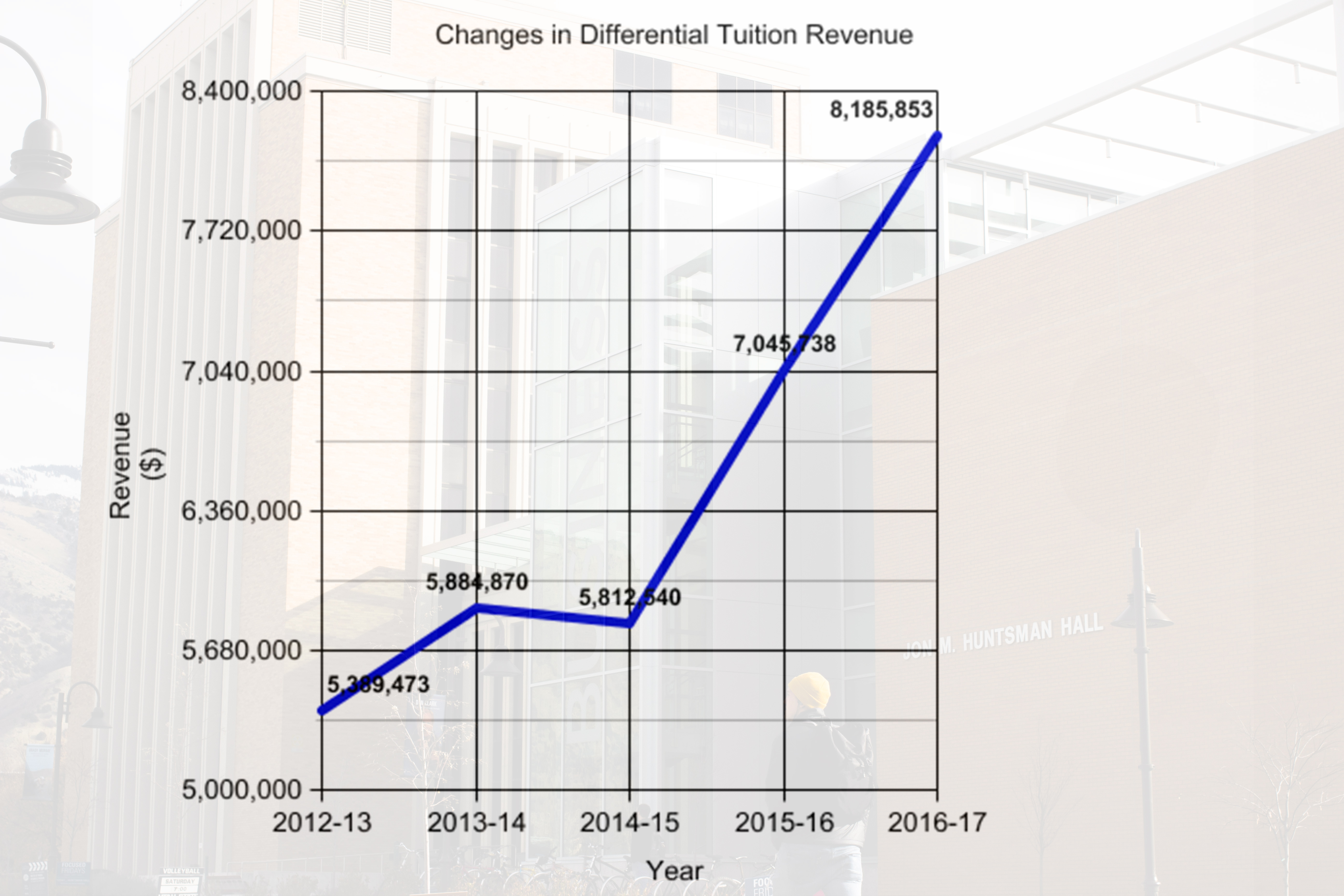$8 million of Huntsman school differential tuition being spent without input from students who pay it
Editor’s Note: Update 11/16/17: The Jon M. Huntsman School of Business announced it will assemble an advisory board to discuss differential tuition for the first time in December. Read full story here.
BREAKING: the @huntsmanschool sent this out to it's students in response to our story. #uted #utpol pic.twitter.com/jhI7uX4LSL
— Utah Statesman 📰 (@UtahStatesman) November 16, 2017
The Jon M. Huntsman School of Business collects more than $8 million annually through differential tuition. How that money is divvied up is supposed to be decided by an advisory board to the dean made up of students, faculty and staff.
That board, however, has never met.
The lack of a board’s existence hasn’t prevented tuition increases or stopped the dean’s office from spending the money from the school of business. On average, business students pay $2,000 per year more than other students at Utah State University.
In an interview with The Utah Statesman, Associate Dean Dave Patel — who was set to oversee the board until the 2017-18 academic year— originally provided a list of would-be faculty board members and said, “We met with Ben [Vera, 2015-16 Utah State University Student Association business senator]…it’s met once.”
The Statesman filed a public records request for all written records of any past meetings.
Patel then admitted the board had never actually met.
“Ben did remind me we never met as a board,” Patel said in an email to The Statesman. “Our best recollection is that we did not confirm a time when everyone could meet.”
“That is my fault entirely,” he added.
The Statesman contacted all five faculty members Patel said were on the board — two stated via email they had never been involved with this board or differential tuition, while the other three did not respond.
According to the one-page business charter for the differential tuition advisory board, “The board will review the use of funding provided through differential tuition and make recommendations to the dean regarding the use of funding.”
The college’s website states the funding is used for personnel — such as faculty and staff — “program support” and “administrative infrastructure.”
The Statesman has filed a public records request seeking a more specific breakdown than is provided on the website to examine spending while the board was non-existent and will provide more details as they become available.
Assembling an advisory board
Although the advisory board has never convened, 2016-17 USUSA Business Senator Nadir Tekarli said he tried to gather members and get meetings started, but faced obstacles when doing so.
“I honestly did not think it would be a big deal at all,” Tekarli said of recruiting board members. “This board, to me, was something that could build some more trust between students and administration, which I see as being a good thing for all sides, but unfortunately it wasn’t able to be that way.”
Tekarli said the board’s lack of meeting has been problematic for many business students.
“We’ve seen a lot of students complain about differential tuition,” he said. “Keeping it all in the dark is not going to make you any friends.”
Tekarli reached out to students from each department in order to convene a board, but said problems with administration kept that from happening.
“[The administration] seemed supportive but never really did anything about it,” he said. “As it stands, [the board] is just a charter.”
The board’s charter instructs the responsibility of chair to fall on the school’s current Associate Dean for student affairs, Vijay Kannan.
[scribd id=364372157 key=key-983a7tmdFAabbcU7lhcI mode=scroll]
Making sure there is absolute transparency
“What we want to do is we want to make sure there is absolute transparency,” Kannan said, “The last time we met… it’s been a few years.”
That statement was later refuted by Patel in his comments to The Statesman.
Every level of the school of business should be involved in the process, according to the charter.
To provide input from all levels of the business school, “[board] members shall be selected through recommendations from the USUSA business senator, department heads, and the deans’ office,” the charter states.
These members are to include undergraduate and graduate students, faculty, staff and administration.
It wasn’t even clear to some members how often the board needed to meet.
“The only time I’ve ever understood them to meet is when there’s a proposed increase,” said Cody Davis, the USUSA business senator, who is tasked by the charter with selecting students to sit on the board.
During his interview, Davis also stated the advisory board met “annually” and “as-needed”.
However, the charter stipulates they are to meet at least annually, “with additional meetings to be called as needed to carry out the responsibilities of the board.”
“It definitely doesn’t paint a positive picture of what the administration is,” Tekarli said. “It doesn’t make anyone think ‘oh, they’re trustworthy.’ I think there’s really no positive for doing this … it just seems lazy and it’s just generally a bad idea.”
The revenue from differential tuition increased just more than $3 million over the last five academic years, according to the college’s website.
How differential tuition compares with other colleges at USU
The business school is one of three USU colleges using differential tuition. The business school’s tuition is higher than that of the Caine College of the Arts and the College of Engineering.
Chris Terry, associate dean of the Caine College of the Arts, said the advisory board monitoring the art school’s differential tuition meets annually and provided documents detailing the committee’s decisions.
“Committees can be a pain in the neck,” Terry said. “It’s hard to have a big group of people agree on everything, but it is necessary … it’s about transparency, being sure everyone knows what’s going on, that’s why we have a committee.”
Terry added he feels no matter the amount of work it takes to find a time for meeting, the transparency that results from gathering a board is imperative.
The business school’s advisory board never met because, “it was really a scheduling issue,” Patel said. “We have 13 or so people — just getting everybody at a time conducive to meeting, that’s why we did not have a meeting last year.”
The College of the Arts’ advisory board follows a three-page charter, and raises differential tuition if a majority of the committee agrees to do so, contrasting with the business school, that has a one-page charter and has raised tuition without advisory board meetings.
While enrollment in the business school has increased 16 percent since 2012, revenue from differential tuition has increased 34 percent, without ever having recommendations from the board.
In an email sent to The Statesman, Patel said he received student input and has “met with the business council every year for the past six or seven years,” to discuss differential tuition. Tekarli, who led the 2016-17 business council, said Patel met with the council once to discuss the Huntsman-Koch donation, but did not discuss differential tuition.
“That was the one time he came to our meeting,” Tekarli said.
He said there are a lot of students who don’t trust what the Huntsman School of Business is doing with all the money students are paying.
“If you want students to be more trusting with what it’s being used for and with paying it, tell them what it’s for, have them understand what’s going on.”
—carter.moore@aggiemail.usu.edu





This article paints the administration of the Business School as a shady group of oligarchs that are attempting to ruin higher education, which their not. The business school outperforms other colleges on almost every level.
It should be noted that both Senator Tekarli and Senator Davis have both been completely inept when it comes to performing their duties. Senator Tekarli focused solely on painting the Koch gift as evil, and in doing so almost cost the school $50 million. While claiming to represent the entire student body’s apprehension to this gift, he, in reality, represented a very small, vocal faction of the business school.
Senator Davis openly admitted during a debate last year that the only reason he wanted to Business Senator position was to make his resume look better for physical therapy school.
Both Senator’s have been guilty of putting too much effort into student events, and not enough effort into student advocacy.
If the author’s of this piece want more transparency at the business school, they should produce an article on the complete ineptitude of student leadership.
they’re not their.
The administration isn’t trying to ruin higher education, just have a successful career. A success that is defined by new buildings, more students, and more donations. From my experience, their care for students is ancillary to these factors.
And the business school should outperform as you pay more to go there then any other college; the problem is that the school is not outperforming relative to the amount of student dollars flowing in.
I agree that the student leadership has been inept, at least Senator Tekarli is now trying to do something, albeit after his time in office.
Maybe i feel this way because i am just part of that small vocal minority you mention, while you represent the silent majority, or maybe it is the other way, i don’t know.
Than not then lol
I do think you represent a minority. You were an active member and supporter of the old Huntsman Scholar Program, which was axed the administration for a variety of reasons. The leadership of this program were some of the most active resisters to the Koch gift.
I tend to believe that the majority of students would support the receiving of a $50 million gift. Regardless of where it came from.
Senator Tekarli is trying to do what? Make the administration look bad because he disagrees with them and their donors politically?
Let it be known I think there should be openness surrounding the distribution of funds, I just think that Senator Tekarli’s outrage, as well as that of the old Scholar program, is politically motivated.
Let’s unite around our common belief of the need for better student leadership. Unbiased leadership that would advocate for openness, but because it’s the right thing to do, not because they disagree politically.
While the article does paint a rather bleak picture on all sides I believe it still carries extremely valid and pertinent points. The fact that this board has never convened over the course of several years over the matter of what seems to be 20+ MILLION dollars is inexcusable. Despite the excessively harsh picture it paints on board members it still does not excuse them from their neglect to properly live up to the charter. My personal opinion is that the faculty, as well as student leadership, have failed this “contract”. If I as a student am expected to pay differential tuition with steep punishments imposed if I fail to do so (down to missing just a few dollars and cents) than there absolutely needs to be some form of accountability imposed upon the faculty who have a responsibility. In all honesty, if these funds have been misappropriated or ineffectively used on a wide scale there should be some sort of refund given back to students. The lack of transparency on what these funds have been used for and the fact that the rates have increased without proper approval demands some sort of action. Either through the partial refund of differential tuition to students or through a reorganization of this board.
I think it’s a shame the board has never met, because decisions about raising and spending differential tuition shouldn’t be made without the input of all stakeholders–especially students. I appreciate the authors of this article for calling attention to a troubling situation that needs to be addressed. Though they are not sympathetic to the seemingly legitimate points raised by some of those who were interviewed (e.g. Davis is probably unsure about how often the board meets because the document doesn’t specify and there isn’t much precedent to look at). I applaud the length they went to in an effort to uncover the truth (i.e. public records request challenging Patel’s claim the board met).
I think accusations that the administrators in the business school as self-interested, scheming, or unconcerned about students are wildly and naively inaccurate. Administrators don’t bring in more funding, open new buildings, and recruit more students to further their career; they do it to improve the caliber of the business school.
I don’t think difficulty arranging a meeting is a sufficient reason to not convene the board. But I also think that’s the real reason the board didn’t meet; the administration was negligent, not nefarious. A decent chunk of the blame falls to past and current student leaders, namely the Business Senator, who did not work proactively enough to represent the interests of students.
John, I’ve told you so many times to stop using a pseudonym on the internet! You should be proud enough of your viewpoints to express them as your true self – maybe then I will be too!
In the words of patron saint of business,
“Who is John Galt?”
Hi John,
I understand where you’re coming from in regards to better student leaders. Be it student leaders or those in leadership positions in general, people are people and will fall short. However, could you point to specific issues Sentators Tekarli or Davis didn’t/haven’t addressed? What have they (or haven’t they done) that you would recommend changing?
Additionally, did you vote in the previous USUSA election? For reference, I’d like to point out that only 32% of the student body chose to vote in the election. This is an issue. Students are frustrated with student leaders, but they don’t take initiative to change it. All students have the opportunity to run in the USUSA elections and assuming you’re a student, I would recommend you do if you have ideas or changes you would like to make seeing as you believe the current and previous senators are “inept.” Additionally, even if some students did vote (again, potentially you, assuming you’re a student), statistically speaking, a majority of students did not; not all of your friends or classmates voted. Had you, or anyone for that matter, spent a few hours during elections week advocating for issues that they believe in, running themselves, or campaigning for a candidate they agree with, maybe you and other students wouldn’t be as upset with “inept” student leaders. If you want to see change, do something about it.
Finally, I think it’s important to address the fact that these student leaders are just one of the “up to eleven members,” (as noted in the charter) on the board. Although the charter does state the the USUSA Business Senator is able to recommend members of the board, the Dean oversees the board, so had the current or previous senators made suggestions, the Dean of the School of Business is responsible to oversee the committee.
I have to say that I appreciate articles like this one. For those who feel offended – this is what journalism is for. It’s not to drag people down (as some on this thread have suggested), it’s to shine light on problems that need fixing.
This article doesn’t have to be damning for the business school. The business school just needs to fix the problem and report back.
I apologize for not knowing you as well as you know me.
I honestly believe we can agree on the following things pertaining to differential tuition (the point of the article, not the gifts you reference in your comments):
1. Transparency as to how student funds are used is a good thing,
2. There was not transparency in the past at the USU Huntsman school,
3. Fault for that lack of transparency can be apportioned between an inept student leadership and an inept administration.
We disagree as to that apportionment; I think the administration is more at fault, you the student leadership. But I think we can agree that both groups bear at least some blame.
If I have misrepresented you and you disagree about any of these 3 things, please let me know.
I am glad this article was published. It has raised awareness about these 3 issues and is allowing us to discuss what we can do to prevent something like this from happening again.
Students need to unite around the need for transparency. Differential tuition is students’ money, not a donation or gift; students should have a say in how it is used. Outrage about transparency is not a political issue. A student who wants transparency should get it, regardless of what their political beliefs are. Especially when that transparency concerns the potential misuse of 8 million dollars of public funds.
Let’s focus on solving the problem and preventing it from happening again. Let’s focus on what changes we can make to student leadership and administration. Let’s focus on helping students.
To start, I have forwarded this article to the state auditor.
I think this article is misleading and paints a picture that the leaders of the Jon M. Huntsman School of Business are corrupt. They’re not.
I’m a junior studying Marketing. I’ve had nothing but wonderful professors since I entered the school of business. I always feel like I’m getting a quality education. I’m perfectly content to pay an extra $2,000 a semester considering most business schools around the country are ten times more expensive. Think about it…Huntsman Hall didn’t just magically appear. Excellent professors don’t just head to Utah State without an incentive. Some things require money! If we want the school of business to get better and more competitive, there needs to be a proportionate amount of funding.
Let’s cut Dave Patel some slack and trust that he’s doing his best with the resources he has.
Trust someone who has no record of what he is doing with my money? I am sorry, but that is just bad business sense.
How is Patel even a Dean when he has no academic credentials and no Ph.D.?
It’s funny that one of business schools core values/pillars is Ethics. Some of these guys should take some of the business ethics classes they require students to take! If this were a corporation so many would be fired by this point, this is a straight-up joke and makes the business school look bad. I can’t in good conscience recommend the business school. I don’t mind paying differential tuition, but for my hard earned money to be thrown around, and not go where it’s supposed to go and treated as extra spending money is awful. Give me specific examples of where this money is going, not generic bs answers. It’s such a poor excuse that they can’t get 13 people together, there are large corporations can get board of directors together to make decisions. This just shows the level care the school has for their students.
Seriously! It really makes you feel slighted. I mean, even if they aren’t “corrupt” they clearly, at the very least, do not care.
My husband and I have been outraged about the Business School’s ridiculous differential tuition for a few years now. He was getting a minor in business and we had $1,000 worth of differential tuition for ONE CLASS!!! I really don’t care if the business school “outperforms other colleges on almost every level” that kind of extra cost on top of tuition is just freaking ridiculous. Just another way people take advantage of college students. Its criminal, and now knowing that the board hasn’t met for years because it was too hard to find a time makes me feel sick to my stomach. For us struggling to make ends meet with families trying to get through college this is simply cruel and inconsiderate. We ended up dropping his minor because we honestly couldn’t afford it. My sister-in-law did the same thing with her business minor for the same reason.